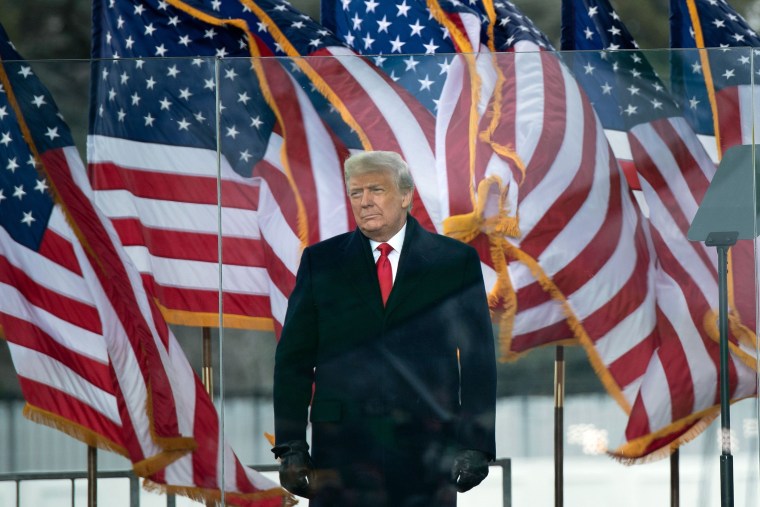A federal appeals court on Friday rejected former President Donald Trump's bid to dismiss civil claims seeking to hold him to account for the Jan. 6 riot, 2021 at the U.S. Capitol, denying his claims of presidential immunity, at least for now.
"The sole issue before us is whether President Trump has demonstrated an entitlement to official-act immunity for his actions leading up to and on January 6 as alleged in the complaints. We answer no, at least at this stage of the proceedings," a panel of judges from the U.S. Circuit Court of Appeals for Washington, D.C. said in its ruling.
The three judges noted that Trump is alleged to have instigated the riot during the course of his re-election campaign, and said, "When a first-term President opts to seek a second term, his campaign to win re-election is not an official presidential act."

The ruling allows a large number of lawsuits seeking to hold Trump accountable for the deadly riot to move forward. The cases had all been stayed while the appeals court weighed the immunity issue, which they said would have to be revisited in the lower courts.
"In the proceedings ahead in the district court, President Trump will have the opportunity to show that his alleged actions in the runup to and on January 6 were taken in his official capacity as President rather than in his unofficial capacity as presidential candidate," the ruling said.
The ruling also suggested he might have an uphill climb.
“In arguing that he is entitled to official-act immunity in the cases before us, President Trump does not dispute that he engaged in his alleged actions up to and on January 6 in his capacity as a candidate,” Chief Judge Sri Srinivasan wrote in the court’s opinion. “But he thinks that does not matter. Rather, in his view, a President’s speech on matters of public concern is invariably an official function, and he was engaged in that function when he spoke at the January 6 rally and in the leadup to that day. We cannot accept that rationale,” he wrote.
“While Presidents are often exercising official responsibilities when they speak on matters of public concern, that is not always the case,” he continued. “When a sitting President running for re-election speaks in a campaign ad or in accepting his political party’s nomination at the party convention, he typically speaks on matters of public concern. Yet he does so in an unofficial, private capacity as office-seeker, not an official capacity as office-holder. And actions taken in an unofficial capacity cannot qualify for official-act immunity.”
In a statement, Trump campaign spokesperson Steven Cheung called the ruling “limited, narrow, and procedural. The facts fully show that on January 6 President Trump was acting on behalf of the American people, carrying out his duties as President of the United States. Moreover, his admonition that his supporters ‘peacefully and patriotically make [their] voices heard,’ along with a myriad other statements prove that these Democrat Hoaxes are completely meritless.”
Trump has made a similar immunity claim in special counsel Jack Smith's criminal case charging that he illegally tried to overturn the election results. U.S. District Judge Tanya Chutkan has not yet ruled on the issue.
The appeals court ruling came in the case of James Blassingame, a Capitol Police officer who was injured in the riot. His suit is one of at least 10 filed against Trump by law enforcement officers and lawmakers who were at the Capitol.
Blassingame said in a statement, "I hope our case will assist with helping put our democracy back on the right track; making it crystal clear that no person, regardless of title or position of stature, is above the rule of law.”
One of Blassingame's attorneys, Kristy Parker of the nonprofit voting rights and democracy advocacy group Protect Democracy, said, “As this case shows, our constitutional order does not grant former President Donald J. Trump immunity for his attempt to subvert our democracy.”
Joe Sellers, a co-counsel for the NAACP and other plaintiffs in a separate civil suit against Trump, called the ruling "momentous not only for our clients but for all Americans. Today’s victory brings us a crucial step closer to holding the former president accountable for the harm brought on members of Congress and on our democracy itself. We look forward to continuing our pursuit of justice through the courts.”
Srinivasan was nominated for the court by President Barack Obama and is a former law clerk for Supreme Court Justice Sandra Day O’Connor, who died Friday. Judge Judith Rogers was nominated by President Bill Clinton. The third judge involved in the ruling, Gregory Katsas, is a Trump nominee who clerked for Supreme Court Justice Clarence Thomas.
The ruling does not go into effect for a week to give Trump time to seek to have the issue heard by the entire appeals court.
